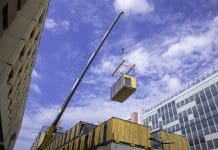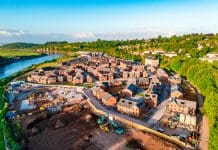The initial innovative iKozie home is ready to house its first occupant, helping to ease homelessness in Worcester, UK
It’s estimated that across England, around 500 people sleep rough every night and the demand for temporary housing is on the rise. The iKozie home is a practical, flexible solution from The Homeless Foundation and provides a cosy, self-contained home to help people regain their independence.
The iKozie home has long been a vision and work in progress of The Homeless Foundation. Measuring 186 square foot and inspired by the crafted designs of first class airline cabins, the iKozie caters to the individual’s needs. Incorporating a living area, fully-fitted kitchen, a bedroom, and a bathroom into its compact design, the iKozie aims to revolutionise how councils across the country tackle the issue of homelessness. The Homeless Foundation predicts that their forward-thinking design will be used as move-on accommodation to help people successfully transition from hostels to independent living. Worcester City Council is the first to pioneer the iKozie home concept.
Kieran O’Donnell, Trustee of The Homeless Foundation, said: “After years of planning we’re delighted that the iKozie project has become a reality and will soon be home to someone who is currently homeless. With the first iKozie now in place, we’re able to demonstrate that the concept works and we hope that more councils will embrace the idea over the next few months. We’re thrilled at how the project has progressed so far and would like to offer our thanks to everyone that has helped make it happen.”
Mike Johnson, Chair of Worcester City Council’s Communities Committee, added: “Worcester City Council is proud to support such an interesting and innovative concept. We wish the Homeless Foundation every success and will continue to work with them on future plans to create more iKozie homes for our city.”
At a cost of around £40,000, the iKozie home is more cost effective than traditional homes and can be placed in an array of areas, including brownfield sites. Manufactured off-site and then lifted into place, it’s possible for councils to create sustainable communities.














